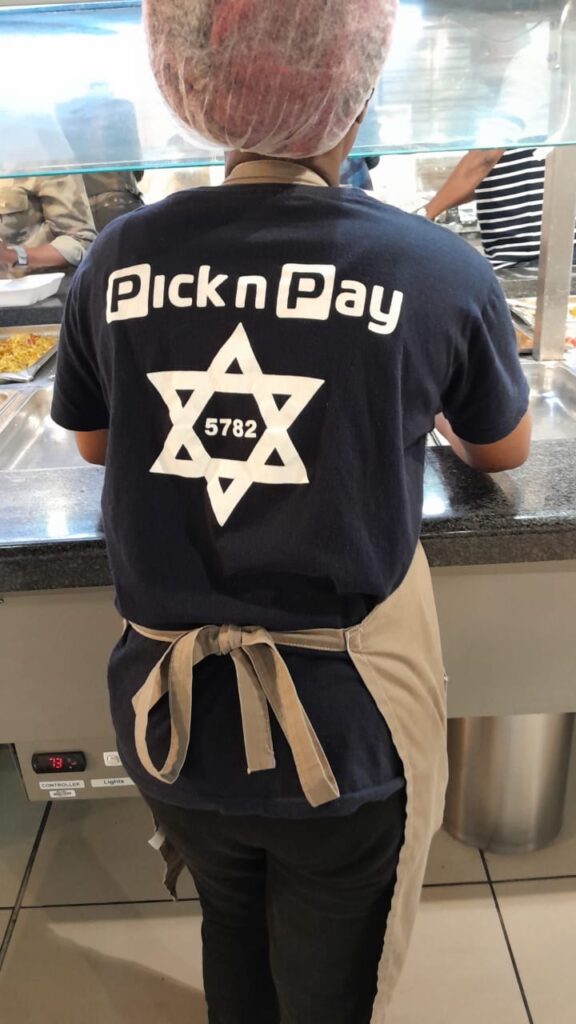A Personal Journey Through A Misunderstood Photograph
As we navigate the intricate tapestry of life, we are incessantly learning. Some may argue that these lessons are merely to be passed on, a legacy of wisdom for future generations. However, I am of the belief that these teachings are not only for the betterment of others but are crucial for our own growth and understanding as well. A recent personal experience reaffirmed this conviction, prompting a deeper reflection.
A few days ago, I shared a photograph on my Facebook page that had already been making the rounds in a group chat. The image, which I found deeply unsettling, showed employees at a South African store wearing T-shirts adorned with the Star of David.

My immediate reaction, fueled by my strong stance against the current events in Gaza, was one of outrage. It seemed a flagrant violation of the workers’ rights, a forced identification with a symbol that holds significant historical and political weight.
My post sparked a discussion. Some respondents enlightened me that the particular store, Picknpay, on the waterfront, houses a kosher department, whose workers wear these T-shirts as part of their uniform. Another chimed in that the store celebrates all religions, with employees donning apparel representing various faiths throughout the year. This was news to me and slightly shifted the context of the photograph.
Seeking clarity and aiming to act responsibly, I attempted to contact the store directly. Unfortunately, my efforts to reach someone there were in vain. Nevertheless, I left the post up, transparently updating my followers about my pursuit of the truth.
It was during this time that Mary-Anne Hattingh, a representative of Pick n Pay, graciously reached out to me. As we initiated our phone conversation, I prefaced our discussion with the insights I had garnered from the comments—that the T-shirt could possibly be part of a uniform or related to a store celebration. Mary-Anne was swift to point out that the T-shirt was indeed from a past event in 2021 and not a staple of Pick ‘n Pay’s official attire.
As we spoke, I learned the importance of dialogue and the swift corrections it can foster. I expressed to Mary-Anne my decision to remove the post, particularly due to some responses that had misunderstood my intentions and were advocating for a boycott—a course of action I had never intended to propose. The phone call concluded on a note of mutual understanding and respect, and I was left with an appreciation for the power of direct communication to bridge gaps and correct misconceptions.
This interaction was a testament to the value of reaching out and the opportunities for growth that can occur when we do. It underscored my realization that the lessons we learn are not stagnant; they evolve through our interactions and are enriched when we engage with others with openness and humility.
This incident became a poignant life lesson, a moment of introspection about the importance of context and the responsibility that comes with the platforms we use. In our quest for justice and in our advocacy against wrongs, we must also be vigilant not to become the perpetrators of misinformation. The lessons we learn are not always comfortable, but they are essential for personal accountability.
Moreover, this experience served as a reminder that learning is a humbling journey. It is about evolving our perspectives, questioning our biases, and striving for integrity in our interactions. As much as we educate others, we must be open to education ourselves, to be both the teacher and the student in the classroom of life.
This has instilled in me a renewed commitment to diligence. The rapid pace at which information travels in the digital era is both a blessing and a responsibility. Misunderstandings can spread as quickly as truths, and it is our duty to ensure we are not the conduits of the former.
In a world eager for instant reactions, I will pause for insight. Because as much as our stories are meant to be told, they are first meant to be understood—by us, for us, and then, and only then, by the world.
With Love,
Sharon

